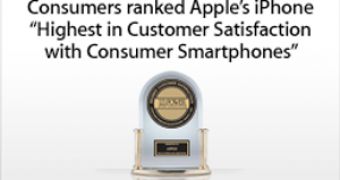Apple has posted an announcement in the iPhone section of its web site pointing to mobile phone satisfaction studies carried out by the folks at J.D. Power and Associates. According to the post, Apple is quite happy with the results of the study (and downright entitled to), where its iPhone ranked highest in the smartphone category with a score of 791 on a 1,000-point scale.
The study in question measures customer satisfaction with traditional wireless handsets and smartphones across several key factors, reveals an official report by J.D. Power and Associates. Key factors in examining traditional wireless handsets are (in order of importance): operation (30%), physical design (30%), features (20%), and battery function (20%). As for smartphones only, key factors are: ease of operation (30%), operating system (22%), features (21%), physical design (18%), and battery function (9%).
Based on these criteria, the J.D. Power and Associates 2009 Wireless Consumer Smartphone Customer Satisfaction StudySM—Volume 1 as well as the J.D. Power and Associates 2009 Wireless Traditional Mobile Phone Satisfaction StudySM—Volume 1 reveal that Apple ranks highest in customer satisfaction with smartphone manufacturers, while LG ranks highest among traditional mobile phone users.
“Apple ranks highest among smartphone manufacturers with a score of 791 on a 1,000-point scale, performing particularly well in ease of operation, operating system, features and physical design,” according to J.D. Power and Associates. “LG (772) and Samsung (759) follow Apple in the rankings,” the report says. “Among traditional handsets, LG ranks highest in overall wireless customer satisfaction with a score of 733, performing well across all factors. Sony Ericsson follows with 712,” the report adds.
Some key wireless handset usage patterns were also revealed by the studies. More than 40% of smartphone users say they've entirely replaced landlines with mobile phones, while only 28 percent of traditional handset owners have made the move, the report outlines. Other findings include:
- One-third of traditional mobile phone owners indicate they would like to have some type of GPS software or capability on their next phone. - 42% percent of traditional mobile phones owners received their phone for free after rebates and discounts, compared to just 32 percent in the 2008 Volume 2 study.

 14 DAY TRIAL //
14 DAY TRIAL //